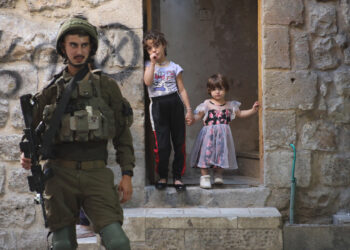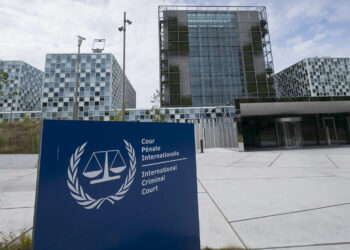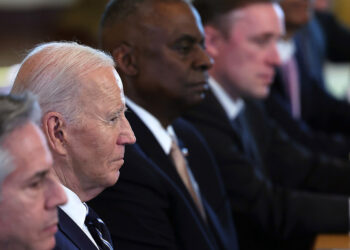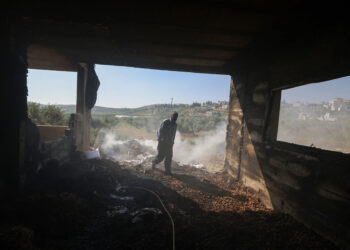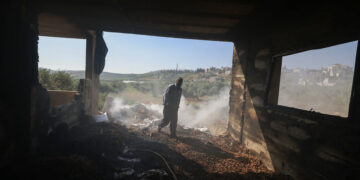Shohreh Laici is an essayist and literary translator from Iran. Her work has appeared in a range of literary journals and magazines, including World Literature Today, The Brooklyn Rail, The Millions, Michigan Quarterly Review, Asheville Poetry Review, Two Lines, and Poetry Daily. My Room in Tehran Is Called America, a memoir and documentary that details her journey from Iran to the United States, is forthcoming.
"The opposite of love is not hatred but indifference." I read this quote by Holocaust survivor Elie Wiesel in Palestine Wail, a new book of poetry by Yahia Lababidi, and it took me back to Tehran and the years I had been a journalist there, living in a closed society ruled by a brutal regime. At that time, I often read the work of Iranian writer, poet and political activist Mohammad Mokhtari, who was not indifferent about the pain and suffering of others who didn't even speak the same language as he did or were citizens of a country that were considered an enemy of his.
Mokhtari was abducted in his rural village of Aminabad, in the mountains outside Tehran, in December 1998. His body was found a week later. He was widely suspected of being killed by Iranian intelligence agents, during a wave of killings of more than 80 dissident intellectuals that began in 1988, which became known as the chain murders.
Years after his murder, when I was 18 years old in Tehran, I read The Practice of Tolerance, a book of essays by Mokhtari on censorship and political repression, but also critical thinking on culture, art, literature and freedom of expression. (His books were still published in Iran, but like much of his work, part of this essay collection was censored.) One of the essays, "Merry Christmas, Mr. Havel," is written in the shape of an open letter by Mokhtari to Vaclav Havel, the prominent Czech literary figure and political leader. The essay was first published in the early 1990s by an Iranian independent magazine, Gardoon, and was signed by 50 Iranian independent writers who were members, alongside Mokhtari, in the embattled Iranian Writers' Association.
In the essay, Mokhtari condemned Havel's support for Czechoslovakia's participation in the First Gulf War, along with other U.S allies. He criticized the West for igniting a war in the Persian Gulf and killing so many civilians, but also condemned Iraq's invasion of Kuwait, which was the initial catalyst. Mokhtari expressed empathy with Iraqi civilians dying under American bombing. Only a few years before, Iraq had been at war with Iran, in a brutal, eight-year conflict. Mokhtari wrote about "conscience versus politics" and criticized any ideology where carnage and war were celebrated over freedom and peace.
His biggest concern, he wrote, was that no one would care about human life during wartime—and this was why he never wanted to side with any political state that started these wars in the first place. The essay's title, "Merry Christmas, Mr. Havel," critically evokes one of the enduring images of the First Gulf War, when a U.S. pilot, just back from a bombing run over the Iraqi capital, said that "Baghdad was lit up like a Christmas tree."
Yahia Lababidi's poems conjure a seemingly impossible future in the Middle East that readers can imagine now. He shows a kind of world that can only exist if there is freedom of expression in the first place.
- Shohreh Laici
Mokhtari was writing against indifference, which he found was pervasive in Iran, especially toward the suffering of neighboring Iraqis, and argued was rooted in Iran's theocratic regime. I have learned since leaving Iran that indifference is not unique to a closed society. Living in the U.S., I have seen over the past year the widespread indifference to the collective punishment of Palestinians in Gaza. As Mokthari forewarned, indifference can transform an open society into a closed one. I have often imagined how Mokhtari, had he not been murdered by the Iranian regime, might have reacted to the events of October 7, 2023—to the atrocities committed by Hamas against Israelis, to Israel's war in Gaza since then, and to the widening war in the Middle East. How would he have responded to free speech restrictions on Palestine, which in many cases are simply attacks on expressions of sympathy with Gaza, in the U.S. and across Europe, democracies that otherwise celebrate freedom of expression? What would he have said about Yahia Lababidi's Palestine Wail being dropped by his first publisher, who objected to the use of certain words?
I found an answer in the poetry of Lababidi, who channels Mokhtari's mission to write against indifference. Lababidi is a prolific poet and writer who is a master of the aphorism, short texts that he renders as somewhere between poetry and prose. He often shares his brief poems on social media, offering the kind of depth and humanity rarely found on a Twitter feed.
"In this moment where it seems the grand narratives are failing to hold our attention, maybe the humble epigram can do its work," Lababidi once told an interviewer. "While deceptively slight and slender, then you sit with it, and perhaps it liberates you somehow, or reminds you of what you've forgotten."
When I received a copy of Palestine Wail, it was eight months after October 7. Truth be told, I was initially hesitant to review the manuscript. Anything associated with Palestine, Gaza and the war reminded me of my own trauma while I was living in Iran in 2009 during the anti-regime protests that were brutally repressed. It remains an open wound for me today. I still have nightmares about trying to escape the pro-regime militias in Tehran that terrorized protesters.
Then Lababidi contacted me, to share the news that his publisher had dropped his book from publication after eight months of collaborating with the poetry editor. "I felt like a mother who miscarried: shocked, empty and sad," he wrote. "I was told I could not use terms like genocide, extermination, murder or chosen people…. desperately searching for a new publisher."
He eventually found one, with Daraja Press, a nonprofit publisher based in Canada. Because of his struggle to get Palestine Wail even published, Lababidi's poetry, and its cry for peace, took on new meaning for me—about the ability to speak openly, to express yourself freely. A poet's identity is to use words to create new language. A poet's responsibility is to create language that challenges institutions of power and revolts against the domineering narratives in society, especially when they try to restrict any alternative. When a publisher like the one who dropped Lababidi's book threatens words themselves, free expression itself is threatened.
Lababidi's poems conjure a seemingly impossible future in the Middle East that readers can imagine now. He shows, in a poem like "Middle East Advice," a kind of world that can only exist if there is freedom of expression in the first place.
To begin a conversation.
about Palestine & Israel
first, you must say:
I am your brother
& you are my sister
I am sorry
how we wronged
ourselves
& the human family
Then, you can speak of history
and compare your losses
Finally, you must embrace
in pity
and be silent.
Without freedom of expression, there would be no poems, no language, no words—and no new worlds.
- Shohreh Laici
In his essay "Merry Christmas, Mr. Havel," Mokhtari wrote that humans were not meant to be indifferent or silent about mass murder, pain and the suffering of others, no matter where in the world. Lababidi is following the same path in Palestine Wail. He invites us to not be indifferent about Gaza. Lababidi attempts to build a language in Palestine Wail that challenges the dominant lexicon about Gaza and Israel. He is protecting language—the ability to call things what they are—and in doing so, he is protecting humanity.
Consider his poem, "Say Something."
If you're uncomfortable saying Genocide,
say mass murder,
say boneyard,
say unmarked graves,
say pity the childrensay humanity under the rubble…say Lord, forgive usthe enormity of our sins
At least, say not in my nameI'm waiting to hear from youPlease, say something.
When a poem is censored, it means thought is censored. Thinking is censored. Expression is censored. That is why poets are often the first to be censored in a closed society.
Totalitarian regimes want to control language itself, to dictate a monotonous everyday life devoid of imagination or change. A poet's job is to break the structure, habits and tightening grip of such dominance over language, which is simply another means to monitor and control citizens. Through syntax, grammar and new ways of seeing and thinking, poets portray a new kind of world—a world of new ideas, a world of imagination, a world made in the expansion of the words.
Labadibi channels that aphorism by Elie Wiesel—"The opposite of love is not hatred but indifference"—in a poem, "What Tragedy Teaches Us."
Our friends fall into different camps:those who feel our pain as their own— without hesitation or calculation —will rush to our side,casting their lot with oursseeking to healOthers, tested by fire
or tempted by the world,we must try to forgive:whose tongues are tiedor hands are bound,
by an unspeakable doubt
or allegiance to another painAt least, they wish us no harm& if they do, they do not knowus or themselves well enough…forgiveness only matters,Derrida argued,if we forgive the unforgivable
If you and I cannot remain friends,because we do not see eye to eye,how can we call for peace in our world?
Reading Lababidi's poems alongside Mokhtari's writing has been a forceful reminder that without freedom of expression, I would never be able to tell my own stories. Without freedom of expression, there would be no poems, no language, no words—and no new worlds.












